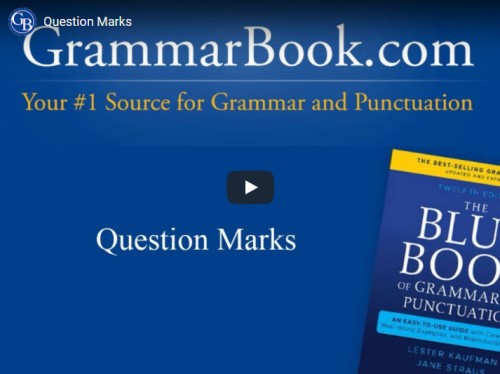|
The English language includes four types of sentences: declarative, interrogative, exclamatory, and imperative. This discussion will focus on exclamatory sentences.
What Is an Exclamatory Sentence?
A declarative sentence “declares” something (e.g., facts, thoughts, opinions), an interrogative sentence asks a question, and an imperative sentence issues a command.
An exclamatory sentence imparts a strong expression or emotion. It achieves this by ending with an exclamation point (!). We can think of an exclamatory sentence as a more-forceful declarative sentence.
Declarative: That is a great shirt.
Exclamatory: That is a great shirt! |
The tone or feeling behind an exclamatory statement can represent a range of emotions, such as surprise, joy, anger, or sorrow.
Examples
Surprise: I didn't think you'd make it to the party!
Joy: I'm so glad you're here!
Anger: I can't believe you just said that!
Sorrow: I wish this would not have to end! |
You likely use exclamatory sentences in your writing and speech often. In writing, an exclamation point achieves what your voice inflection does when you speak. Compare the following statements:
They delivered the mail today.
They delivered the mail today! |
The first sentence is declarative; the second is exclamatory. Using a period (declarative) or an exclamation point (exclamatory) will deliver different thoughts for your readers to interpret.
You can envision how each would sound if you spoke it. In the second sentence, the exclamation would be apparent in your voice. When the same statement is written, the exclamation point transforms an otherwise humdrum remark into something with extra meaning and verve.
Because of their energy, exclamatory sentences may often appear in certain types of ads and headlines. When used properly, they can add texture and tone to daily formal writing as well.
At the same time, as a writer with a sense of nuance and placement, you'll want to apply some curbs on exclamatory sentences to ensure your writing remains well balanced.
Exclamatory Sentences: Helpful Guidelines
Keep the following principles in mind when using exclamatory sentences.
1) Avoid overusing exclamatory sentences.
Too many exclamatory statements can become disruptive and off-putting. Consider the following sentence:
| Akila stepped out into the sunshine! The day was awake and alive! She bent down and brushed her fingers on the grass! What a joy it was to be free! |
This bundle of exclamatory sentences makes what could be meaningful thoughts distracting. Let's revisit them with greater restraint:
| Akila stepped out into the sunshine. The day was awake and alive. She bent down and brushed her fingers on the grass. What a joy it was to be free! |
This treatment communicates with greater depth and does not distract from the words by drawing attention to the exclamations.
2) Remember that exclamatory sentences are not commands.
If a sentence includes a command, it is not exclamatory: It is imperative. You can distinguish an exclamatory sentence from an imperative one by noting again that an exclamatory sentence is a declarative statement with extra force behind it.
Imperative: Watch out for the pothole!
Declarative: You should watch out for the pothole.
Exclamatory: You should watch out for the pothole! |
Exclamatory sentences also express the sentence subject while imperative sentences omit it as understood. In the examples above, the declarative and exclamatory sentences both identify “you” as the subject. The imperative version excludes the subject and begins with the verb, “watch.”
Be aware of sentences that appear exclamatory but are not. Two examples are Merry Christmas! and Happy Birthday! These expressions are shortened commands: (Have a) Merry Christmas! (Have a) Happy Birthday! This makes them imperative sentences.
3) Use one exclamation point in daily formal writing.
In emails, text messages, and social media posts, using more than one exclamation point can be common and accepted for conveying greater emotion or feeling.
In daily formal writing, however, they can often strike readers as unsophisticated and even unprofessional. Good writing in this format should require only one exclamation point to achieve the desired effect.
Coarse: Remember to bring your self-assessment!!
Better: Remember to bring your self-assessment! |
4) Distinguish direct exclamations from indirect ones.
Up to this point we have been discussing direct exclamatory sentences, which add emotion or urgency to a declarative statement.
An exclamation might also be expressed indirectly; in this case, it would be treated as a declarative statement.
Direct exclamatory sentence: They said that we shouldn't go in there!
Indirect exclamation (declarative): They exclaimed that we shouldn't go in there. |
We would not add an exclamation point to the indirect exclamation because the verb already conveys the emphasis.
| 




